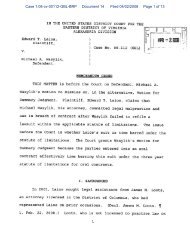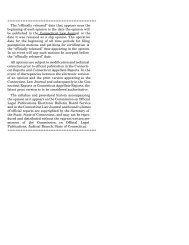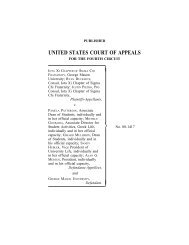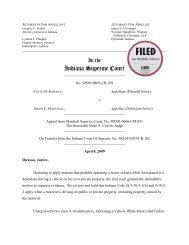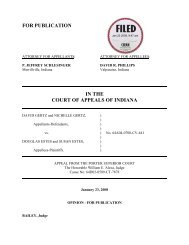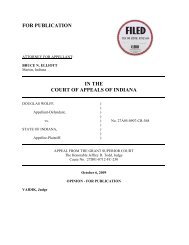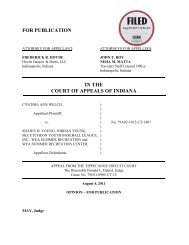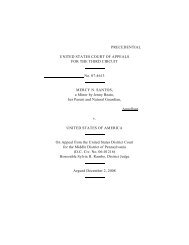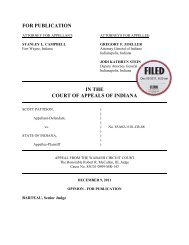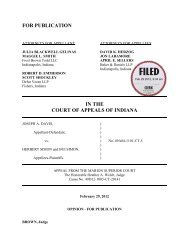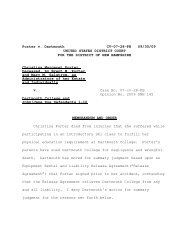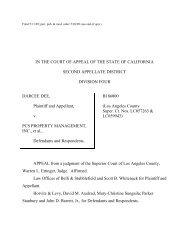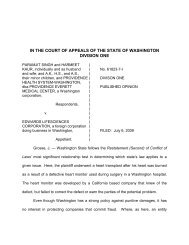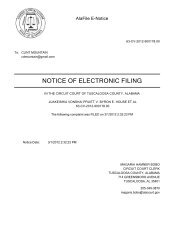141837-Opinion - Michigan Courts - State of Michigan
141837-Opinion - Michigan Courts - State of Michigan
141837-Opinion - Michigan Courts - State of Michigan
Create successful ePaper yourself
Turn your PDF publications into a flip-book with our unique Google optimized e-Paper software.
threatened use <strong>of</strong> physical interference or force or a knowing failure to comply with a<br />
lawful command.” MCL 750.479(8)(a); MCL 750.81d(7)(a) (emphasis added).<br />
Accordingly, while an individual who physically interferes with or forcibly resists an<br />
<strong>of</strong>ficer may be guilty <strong>of</strong> “resisting” or “obstructing,” regardless <strong>of</strong> whether the <strong>of</strong>ficer’s<br />
conduct was lawful, an individual who fails to comply with an <strong>of</strong>ficer’s command may be<br />
guilty <strong>of</strong> “obstructing” only if the <strong>of</strong>ficer’s command was “lawful.” 3 See Brooks v Rothe,<br />
577 F3d 701, 707 (CA 6, 2009) (“[A] straightforward reading <strong>of</strong> the language <strong>of</strong> [MCL]<br />
750.81d(7)(a) provides that the law can be violated in two ways: by physically resisting a<br />
command, whether lawful or unlawful, or by refusing to comply with a lawful command<br />
without using force.”) (emphasis in the original). By expressly providing that failing to<br />
comply with an <strong>of</strong>ficer’s command can constitute obstruction only if the <strong>of</strong>ficer’s<br />
command was “lawful” and yet expressly removing this same lawfulness requirement<br />
3 The majority holds that “the decision <strong>of</strong> the Court <strong>of</strong> Appeals in this case conflicts with<br />
the statutory language” because the Court “held that MCL 750.81d prohibits a person<br />
from resisting an <strong>of</strong>ficer’s unlawful conduct, yet the statute allows a person to obstruct an<br />
<strong>of</strong>ficer’s unlawful command.” Ante at 12 (emphasis in the original). The decision <strong>of</strong> the<br />
Court <strong>of</strong> Appeals does not, in my judgment, conflict in any way with the statutory<br />
language; rather, the majority simply fails to recognize the distinction between physically<br />
interfering with or resisting an <strong>of</strong>ficer and simply failing to comply with an <strong>of</strong>ficer’s<br />
command. Pursuant to MCL 750.81d, while an individual may be guilty <strong>of</strong> the former<br />
even if the <strong>of</strong>ficer’s conduct is unlawful, an individual can be guilty <strong>of</strong> the latter only if<br />
the <strong>of</strong>ficer’s command was lawful. For example, if a person responds to an <strong>of</strong>ficer’s<br />
unlawful command to hand over his car keys by punching the <strong>of</strong>ficer, this person may be<br />
guilty <strong>of</strong> obstructing the <strong>of</strong>ficer; however, if the person does nothing other than refuse to<br />
hand over his keys, he would not be guilty <strong>of</strong> obstructing the <strong>of</strong>ficer. This distinction<br />
makes perfect sense. It is perfectly logical to punish people who physically interfere with<br />
an <strong>of</strong>ficer, even if the <strong>of</strong>ficer’s conduct is unlawful, yet not punish those people who do<br />
nothing other than fail to comply with an <strong>of</strong>ficer’s unlawful command.<br />
10



